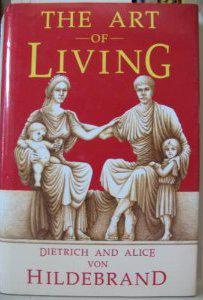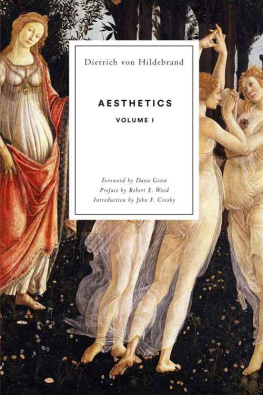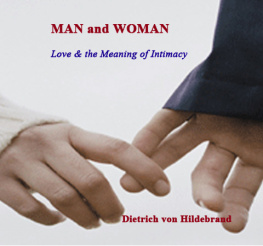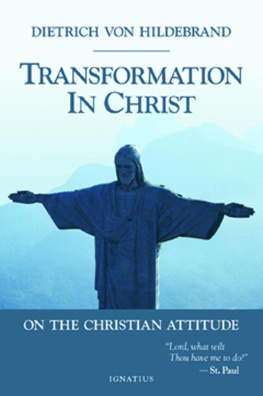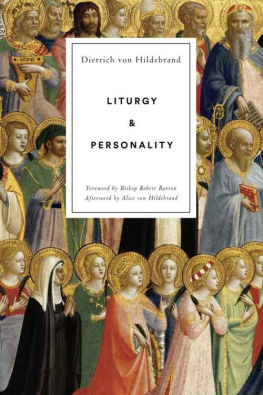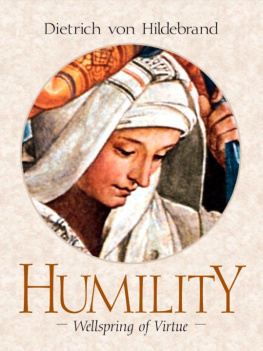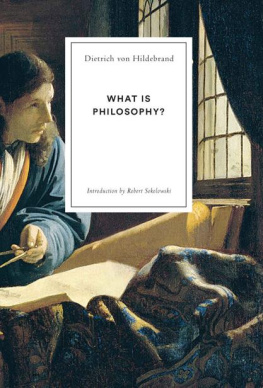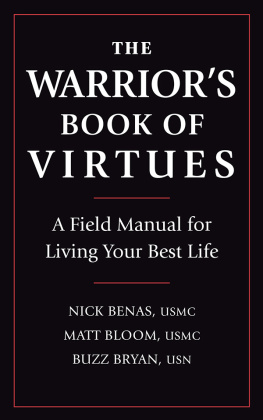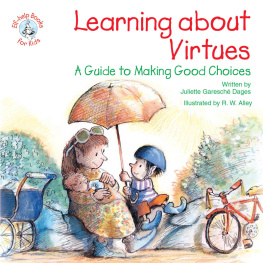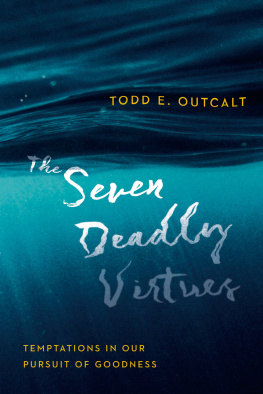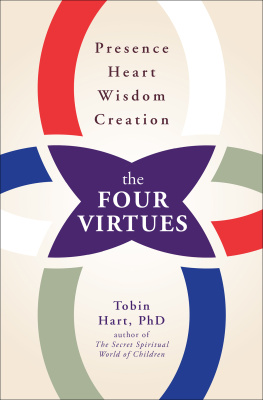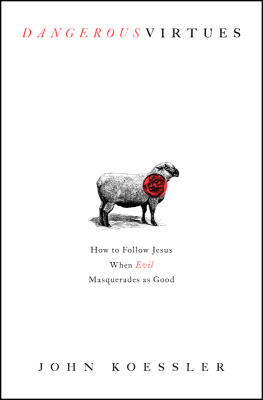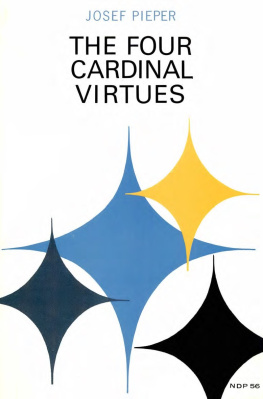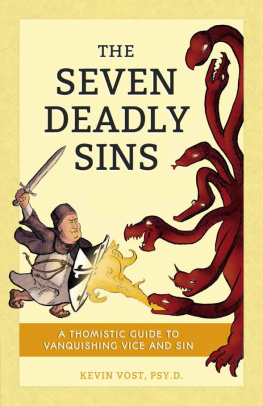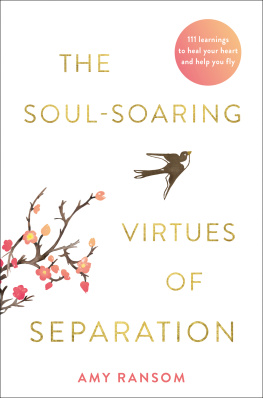Dietrich von Hildebrand - The Art of Living
Here you can read online Dietrich von Hildebrand - The Art of Living full text of the book (entire story) in english for free. Download pdf and epub, get meaning, cover and reviews about this ebook. year: 1994, publisher: Sophia Institute Press, genre: Science. Description of the work, (preface) as well as reviews are available. Best literature library LitArk.com created for fans of good reading and offers a wide selection of genres:
Romance novel
Science fiction
Adventure
Detective
Science
History
Home and family
Prose
Art
Politics
Computer
Non-fiction
Religion
Business
Children
Humor
Choose a favorite category and find really read worthwhile books. Enjoy immersion in the world of imagination, feel the emotions of the characters or learn something new for yourself, make an fascinating discovery.
- Book:The Art of Living
- Author:
- Publisher:Sophia Institute Press
- Genre:
- Year:1994
- Rating:3 / 5
- Favourites:Add to favourites
- Your mark:
- 60
- 1
- 2
- 3
- 4
- 5
The Art of Living: summary, description and annotation
We offer to read an annotation, description, summary or preface (depends on what the author of the book "The Art of Living" wrote himself). If you haven't found the necessary information about the book — write in the comments, we will try to find it.
Dietrich von Hildebrand: author's other books
Who wrote The Art of Living? Find out the surname, the name of the author of the book and a list of all author's works by series.
The Art of Living — read online for free the complete book (whole text) full work
Below is the text of the book, divided by pages. System saving the place of the last page read, allows you to conveniently read the book "The Art of Living" online for free, without having to search again every time where you left off. Put a bookmark, and you can go to the page where you finished reading at any time.
Font size:
Interval:
Bookmark:

Dietrich & Alice von Hildebrand
The Art of Living
Revised and expanded edition
SOPHIA INSTITUTE PRESS
Manchester, New Hampshire
"Congregavit nos in unum Christi amor."
To Madeleine and Lyman
Note: New Testament quotations in this book are taken from the Confraternity of Christian Doctrine edition (Paterson, N.J.: St. Anthony Guild Press, 1941). Old Testament quotations are taken from the Douay-Rheims edition. Where appropriate, quotations from Psalms are cross-referenced with the differing enumeration in the Revised Standard Version, using the following symbol: (RSV=).
Table of Contents
Foreword
By Alice von Hildebrand
"Who is the man who loves life, who desires the day in order to enjoy good things? Keep thy tongue from evil, and thy lips from deceitful words. Turn away from evil and do good, seek after peace and pursue it."
Never in the history of mankind has the average man had so many material possessions and yet never has he been more restless and unhappy. All of us know people who have everything and enjoy nothing. Unhappiness pervades every aspect of their lives: their possessions have become burdens which grant immediate satisfaction but do not lead them an inch closer to happiness.
We can achieve pleasures; but no pleasure regardless of its intensity can satisfy the longing of the human soul. Man is made for better things.
There is something paradoxical in the fact that men yearn so deeply for happiness (which Aristotle claims to be the highest good) and yet so often choose paths which cannot possibly lead them to that goal. Man is often the artisan of his own doom, his own worst enemy.
Today, we rarely meet people whose faces radiate joy and peace. When they do happen to cross our paths, we wish to wrench from them the secret of their joy. What is the precious key that they have found but we do not possess?
The answer is that they have discovered the meaning of human existence, and have mastered the most important and yet the most difficult of all arts, the art of living. By choosing to live rightly, they have been rewarded with a peace "that the world cannot give." This small book offers you basic guidelines about how you can reach this goal. A wise and prudent guide, it will help you learn how to truly live and how, finally, to be happy.
Editor's Note
In the early 1930's Dietrich von Hildebrand gave a series of radio talks in Germany explaining the virtues necessary to a good and happy life. Because his talks were broadcast to a very large public, von Hildebrand wrote them in a style easily understandable by people who have no philosophical training.
His talks were so well received that they were published in 1934 under the title Sittliche Grundhaltung ("fundamental moral attitudes"). In 1950 Alice von Hildebrand translated Sittliche Grundhaltung into English and Longmans Green and Company published her translation as Fundamental Moral Attitudes.
Fifteen years later (in 1965), Franciscan Herald Press published an expanded edition, adding to the original book two chapters by Dietrich von Hildebrand ("Virtue Today" and "The Human Heart") and two by Alice von Hildebrand ("Communion" and "Hope"). The 1965 edition was entitled The Art of Living.
This 1994 Sophia Institute Press edition replaces "Virtue Today" and "The Human Heart" with the very first English translation of Dietrich von Hildebrand's posthumous booklet "Uber der Dankbarkeit" ("On Gratitude"). This substitution creates a more unified book, but is appropriate, as well, because Dietrich von Hildebrand sees gratitude as the crowning virtue and the key to happiness. It is therefore appropriate that the other virtues discussed in this expanded edition of The Art of Living be completed by gratitude as their crowning chapter.
Reverence
Moral values are the highest among all natural values. Goodness, purity, truthfulness, and humility rank higher than genius, brilliance, and exuberant vitality, higher than the beauty of nature or of art, and higher than the stability and power of a state.
Moral values are the highest natural values
That which is realized and shines forth in an act of genuine forgiveness, in a noble and generous renunciation, in a burning and selfless love, is more significant and more noble, more important and more eternal than all cultural values. Positive moral values are the focus of the world; negative moral values are the greatest evil, worse than suffering, sickness, death, or the disintegration of a flourishing culture.
This fact was recognized by great thinkers such as Socrates or Plato, who continually repeated that it is better to suffer injustice than to commit it. This preeminence of the moral sphere is, above all, a basic proposition of the Christian ethos.
Only persons can bear moral values
Moral values are always personal values. They can only inhere in and be realized by man. A material thing, like a stone or a house, cannot be morally good or bad, just as moral goodness is not possible to a tree or a dog. Similarly, works of the human mind (for example, discoveries, scientific books, and works of art), cannot properly be said to be the bearers of moral values; they cannot be faithful, humble, and loving. They can, at the most, indirectly reflect these values as bearing the imprint of the human mind. Man alone (as a free being, responsible for his actions and his attitudes, for his will and striving, his love and his hatred, his joy and his sorrow, and his superactual basic attitude) can be morally good or bad. For far above his cultural accomplishments rises the importance of man's own being: a personality radiating moral values, a man who is humble, pure, truthful, honest, and loving.
Moral goodness comes from the right response to values
But how can man participate in these moral values? Are they given to him by nature like the beauty of his face, his intelligence, or a lively temperament? No, they can only grow out of conscious, free attitudes; man himself must essentially cooperate for their realization. They can only develop through his conscious, free abandonment of himself to genuine values. Man will be rich in moral values in proportion to his capacity to grasp values, insofar as he sees the fullness of the world of values with a clear and fresh vision, and insofar as his abandonment to this world is pure and unconditional.
As long as a man blindly disregards the moral values of other persons, as long as he does not distinguish the positive value which inheres in truth and the negative value which is proper to error, as long as he does not understand the positive value which inheres in the life of man and the negative value attached to an injustice, he will be incapable of moral goodness. As long as he is only interested in the question of whether something is subjectively satisfying or not, whether it is agreeable to him or not, he cannot be morally good.
The soul of every morally good attitude is abandonment to that which is objectively important, is interest in a thing because it has value. Two men are, for example, witnesses of an injustice which is being inflicted upon a third person. The one who in every situation asks only whether something is agreeable to himself will not be concerned about the injustice because he calculates that no personal damage to himself can result from the other's injury. The second man, on the contrary, is willing to take suffering upon himself rather than remain disinterested in the injustice which is about to be done to the third person. For the second man, the preponderant question is not whether something is agreeable to him or not, but whether it is important in itself. The second man behaves morally well, the first one morally badly because he indifferently bypasses the question of value.
Font size:
Interval:
Bookmark:
Similar books «The Art of Living»
Look at similar books to The Art of Living. We have selected literature similar in name and meaning in the hope of providing readers with more options to find new, interesting, not yet read works.
Discussion, reviews of the book The Art of Living and just readers' own opinions. Leave your comments, write what you think about the work, its meaning or the main characters. Specify what exactly you liked and what you didn't like, and why you think so.

